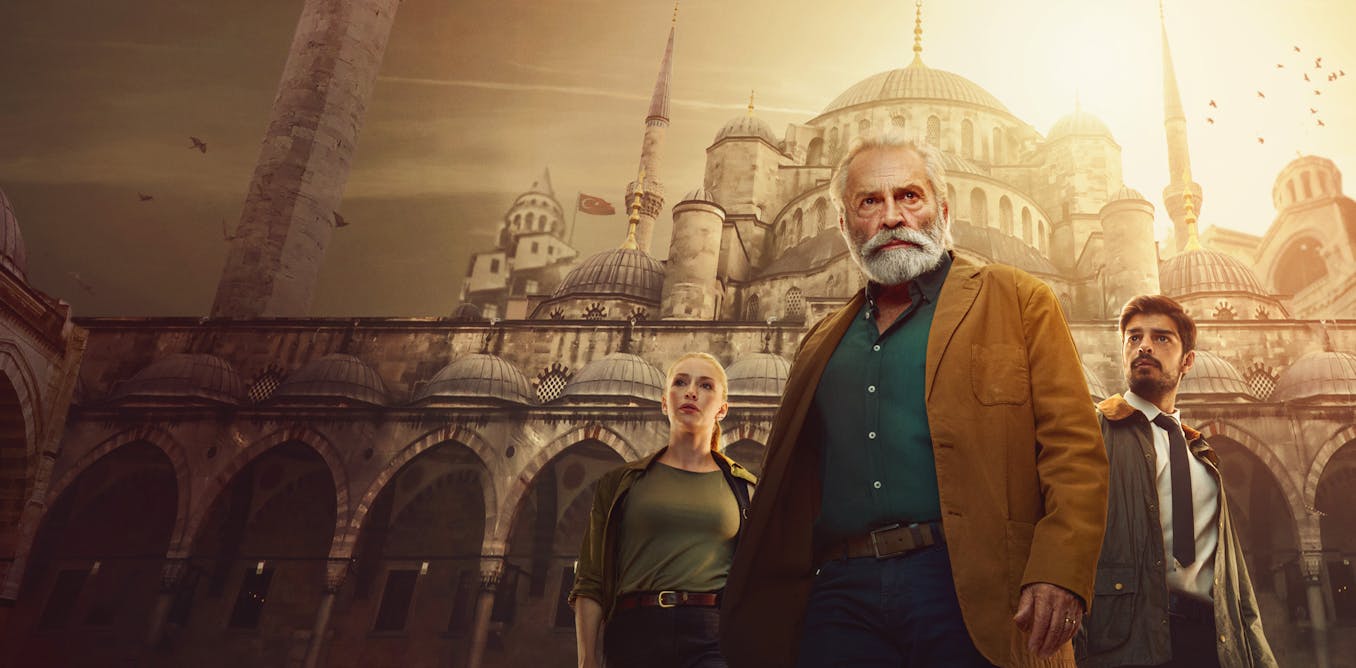In the not so very distant past of British television, capers in the company of avuncular, maverick detectives were the ratings sureties around which peak-time drama schedules were built. Although viewing figures are much diminished, such shows remain plentiful.
These detective stories remain generally compliant with the wisdom that they should have two defining features. The first is an emotionally intelligent, workaholic, central character (or two) who can see what others cannot. The second is an evocative location that harbours the kinds of criminal deviance that they, uniquely, can resolve. A seeming fit for the brief is The Turkish Detective, an adaptation of the Inspector Ikmen novels by English crime writer Barbara Nadel.
Although developed by a British showrunner, the series was made by Turkish production company Ay Yapim for the multinational service Paramount+. Curiously, however, it was given no UK release by the streamer but is instead airing on BBC2 and iPlayer, having been recently acquired by the corporation.
The show begins with the arrival at Istanbul airport of Mehmet Süleyman (Ethan Kai), an officer “transferred” from London, as if Turkey were merely an administrative district in the global empire of the British Constabulary. Although Süleyman claims to have had the “wrong name, wrong skin, wrong religion” for the Met, he is surely there to offer an identifiable vantage for the British viewer.
At first, he mistakes his new boss Çetin İkmen (Haluk Bilginer) for a driver, even attempting to arrest him – but this is merely an orchestrated rookie error to demonstrate how here in Istanbul, they do things differently. Süleyman has a faltering grasp of Turkish – no impediment to joining the homicide team – so conversations are held in English whenever he is around.
Before long, he is speeding off to crime scenes and turning up clues that nobody else has spotted. Such activity enables a warming tourist gaze at artfully composed wide-angled vistas of Istanbul skylines, teeming side streets, stray cats, the sun-drenched glint of the Bosporus strait and, well, more cats.
Of course, it is not Süleyman but Ikmen who is the pre-requisite maverick. This is signalled by his twinkly eyes, chain smoking and the kind of petty disputes with his superior in which television investigators tend to specialise. “Haven’t I taught you anything?” he asks his sergeant Ayse (Yasemin Kay Allen). “Go with your gut and to hell with what everyone else thinks?” she replies, in what sounds like a direct quote from the gospel according to Frost, Lewis, Luther, Grace and just about every titular TV detective there ever was.
A similar self-consciousness dogs the presentation of Istanbul as exotic, enticing and quirky, but seldom threatening. The team are rarely in any real jeopardy, and their caseload of murders (of influencers, rap impresarios and rubbish collectors) offers little to unsettle a tourist.
Instead, and increasingly, the narrative is taken up by laboured, unenigmatic backstories for each officer. Süleyman has several of these, mostly concerning his ongoing secret investigation into an incident involving a former girlfriend. He also has an estranged Turkish father, about whom there can be no real interest, not least because they are reconciled before the first case is even solved.
Ikmen’s domestic life is more intriguing, at least to begin with. His second wife gives birth to a new baby and his older children threaten to go off the rails, encouraged, in part, by his neglect. However, here as elsewhere, too much time is devoted to telling rather than showing, and the secondhand discussion of his family crisis begins to wear thin.
At one point, Ikmen shares his woes with the wealthy father of a victim, but only after spotting on his bookshelf a volume of poetry – not from any Turkish tradition, but by Dylan Thomas. Later, this comes in handy when the man lapses into unconsciousness and Ikmen reads, urging him to “rage, rage, against the dying of the light”.
You cannot help but feel for Bilginer, who has commendably grizzled charisma, but an actor needs lines with more wit than sentiment to make this kind of role work. Given the otherwise deft direction by Niels Arden Oplev, the series’ imperialist premise and clunky scripts are really to blame for its shortcomings.
On this note, it is apt to recall a speech from 30 years ago by the late television writer, Alan Plater, who suggested that the “proper, decent future for world television” should be one in which “I should tell you the stories from my backyard and you should tell me the stories from yours”. Imagine Plater’s dismay at The Turkish Detective and the realisation that for all the lauded “globalisation” of television, we only get to hear the stories which resemble those we have already told.





 Disney’s Streaming Growth Hinges on International Expansion and Local Content
Disney’s Streaming Growth Hinges on International Expansion and Local Content  6 simple questions to tell if a ‘finfluencer’ is more flash than cash
6 simple questions to tell if a ‘finfluencer’ is more flash than cash  Some ‘Star Wars’ stories have already become reality
Some ‘Star Wars’ stories have already become reality  Trump Signals He May Influence Netflix–Warner Bros Merger Decision
Trump Signals He May Influence Netflix–Warner Bros Merger Decision  Jazz Ensemble Cancels Kennedy Center New Year’s Eve Shows After Trump Renaming Sparks Backlash
Jazz Ensemble Cancels Kennedy Center New Year’s Eve Shows After Trump Renaming Sparks Backlash  George Clooney Criticizes Trump’s Tariff Threat, Calls for Film Tax Incentives
George Clooney Criticizes Trump’s Tariff Threat, Calls for Film Tax Incentives  Paramount Skydance Eyes Streamlined Merger with Warner Bros Discovery Amid $60 Billion Offer Rejection
Paramount Skydance Eyes Streamlined Merger with Warner Bros Discovery Amid $60 Billion Offer Rejection  Disney’s ABC Pulls Jimmy Kimmel Live! After Controversial Remarks on Charlie Kirk Killing
Disney’s ABC Pulls Jimmy Kimmel Live! After Controversial Remarks on Charlie Kirk Killing  Trump Proposes Two-Year Shutdown of Kennedy Center Amid Ongoing Turmoil
Trump Proposes Two-Year Shutdown of Kennedy Center Amid Ongoing Turmoil  Oscars 2025: who will likely win, who should win, and who barely deserves to be there
Oscars 2025: who will likely win, who should win, and who barely deserves to be there  How Marvel’s Fantastic Four discovered the human in the superhuman
How Marvel’s Fantastic Four discovered the human in the superhuman  The Mona Lisa is a vampire
The Mona Lisa is a vampire  Trump–Kushner Links Raise Concerns as Paramount Pushes $108B Warner Bros Discovery Bid
Trump–Kushner Links Raise Concerns as Paramount Pushes $108B Warner Bros Discovery Bid  Trump to Pardon Reality Stars Todd and Julie Chrisley After Tax Fraud Conviction
Trump to Pardon Reality Stars Todd and Julie Chrisley After Tax Fraud Conviction  FCC Chair Brendan Carr to Face Senate Oversight After Controversy Over Jimmy Kimmel Show
FCC Chair Brendan Carr to Face Senate Oversight After Controversy Over Jimmy Kimmel Show 
































